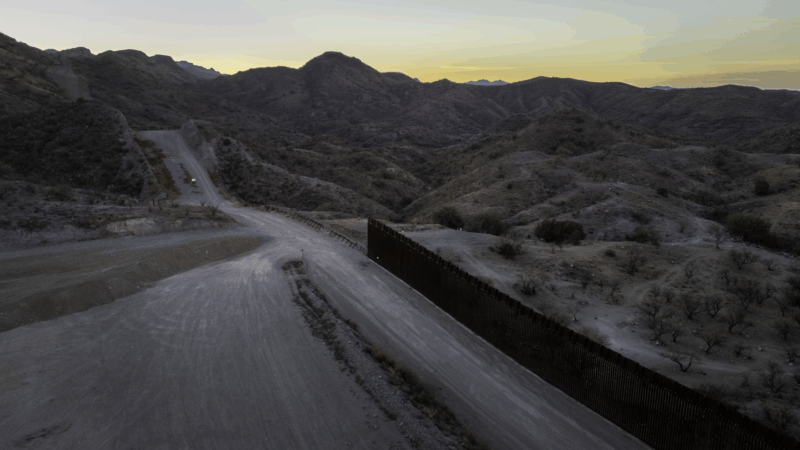How Trump’s big beautiful bill aims to ‘supercharge’ immigration enforcement
President Trump’s signature domestic policy bill is headed to his desk, marking a historic federal investment in immigration enforcement.
The House cleared Trump’s “big, beautiful bill” on Thursday — meeting the president’s self-imposed deadline of July 4.
The massive package sets aside about $170 billion to support the Trump’s administration’s border and immigration goals, which includes detaining and deporting a record number of people from the U.S.
Earlier this week, White House border czar Tom Homan told reporters that Congress needed to pass the bill in order for the federal government to buy more detention beds.
“The more beds that we have, the more bad guys we arrest,” he added.
Both critics and supporters say carrying out Trump’s immigration agenda will depend on how effectively federal agencies implement and deploy those resources.
“It will absolutely supercharge immigration enforcement over time, but it’s not gonna happen overnight,” said Kathleen Bush-Joseph, a policy analyst at the Migration Policy Institute. “So how quickly the Trump administration is able to use this money to fuel its mass deportations campaign is a real question.”
Immigration enforcement
The final bill allocates $45 billion for immigration detention centers, as well as about $30 billion to hire more ICE personnel, for transportation costs, and to maintain ICE facilities, among other spending. It comes as detention centers operate beyond their capacity.
The American Immigration Council estimates that the new funding could expand detention capacity to “at least 116,000 beds.”
Bush-Joseph said the money may help reduce overcrowding and improve staffing. But she is also concerned that it will lead to a broader use of detention.
After migrants are identified as removable from the U.S., they may be released ahead of their court dates, held in local jails, or placed in ICE detention. The Trump administration has made plans to end the policy known as “catch and release” — which allows people to be released from detention while they await an immigration court hearing — but ending it would require more detention space.
Bush-Joseph said that individuals in immigration custody tend to face greater challenges with communication, obtaining counsel, interpretation, and understanding their rights.
“The nature of immigration detention in and of itself is that it’s harder for people to win relief in immigration court,” she said.
Border security
The bill provides roughly $46.5 billion to complete Trump’s border wall. It also sets aside $5 billion for Customs and Border Protection facilities and $10 billion for border security initiatives more broadly.
About $13.5 billion is put toward reimbursing states and local governments engaging in immigration and border-related enforcement.
Some critics have questioned the need for more border security funding, given that the number of people crossing the southern border has fallen to its lowest level in decades — with slightly over 6,000 apprehensions in June, according to preliminary figures released by the Department of Homeland Security.
But Andrew Arthur, a fellow at the Center for Immigration Studies, a think tank that supports restricting immigration, argued that its better to invest in border infrastructure now than wait until another surge in crossings.
“ If we wait until 250,000 people arrive per month, it’s going to be too late,” he added, referring to the peak of monthly arrests hit under former President Joe Biden.
Immigration fees
Republicans also sought to make the immigration process more expensive with increased or new fees.
Among the biggest changes to the immigration provisions from the House to the Senate version is the reduction in the minimum fee required to apply for asylum: from $1,000 in the initial House version to $100 in the final bill. The adjustment came after the Senate parliamentarian determined that the higher fee did not meet the rules needed to qualify for a simple majority vote.
Arthur said adjudicating each application can be costly. “ It’s not unreasonable to expect them to pay at least $100 for their asylum application if only to cover a portion — and a very small portion of that — of the processing and adjudication fees,” he added, speaking about migrants seeking asylum to stay in the U.S.
But Heidi Altman, vice president of policy at the National Immigration Law Center, argued that the new or increased fees will put an “unaffordable price tag on due process” for many immigrants. According to Altman, among the biggest increases is the fee to appeal an immigration judge’s decision: from the current $110 to $900.
“Many of these fees are going to become barriers or obstacles to people making their way through the very basic requirements of the immigration court system,” she said.
Safety net programs
The initial House bill already stripped health coverage under Affordable Care Act marketplaces and Medicare for a range of lawfully present immigrants including refugees, asylees, and those with other humanitarian protections. It also restricted eligibility for the Supplemental Nutrition Assistance Program.
The final version maintains those cuts while extending similar limitations to federal funding for Medicaid and the Children’s Health Insurance Program, according to Shelby Gonzales, the vice president for immigration policy at the left-leaning think tank Center on Budget and Policy Priorities.
“ The truth is that already a lot of people are barred from insurance just based off of not having the right kind of immigration status,” Gonzales said. “The changes that are made in this law go even further.”
Those remaining eligible for these public benefits are green card holders who have completed the five-year waiting period, certain Cubans and Haitians, and individuals residing in the U.S. under the Compacts of Free Association, which includes people from Micronesia, Palau and the Marshall Islands.
Arthur from the Center for Immigration Studies argued that the U.S. already faces a challenge supporting a large number of low-income citizens — even without the additional strain on the country’s social safety nets.
“ It is reasonable to expect those who come to this country to be able to provide for themselves,” he said. Arthur added that states who want to provide benefits should be able to fund them.
Gonzales said her most immediate concern is the limits to SNAP benefits, adding that she is worried whether food banks can meet potential increased demand in the future. “I don’t think that they have the capacity to help people in huge numbers that might be losing access to food immediately,” she said.
The bill’s changes to the Child Tax Credit will also have an impact on immigrant families. Currently, only the child needs to have a Social Security number to qualify for the benefit. While the House initially proposed requiring both parents to have a Social Security number, the final version requires just one parent to do so.
“ The child tax credit will be effectively cut off for kids with two undocumented parents,” said Tara Watson, director of the Center for Economic Security and Opportunity at the Brookings Institution. “That’s a significant amount of money that assists with the wellbeing of citizen children and it will be gone.”
Immigration courts
Over $3 billion is allocated to the Justice Department for immigration-related activities. That includes the hiring of more immigration judges to address the growing case backlog, which was at nearly 4 million cases as of April, the latest data available.
Bush-Joseph from the Migration Policy Institute said the immigration court system is vastly underfunded compared to ICE and CBP, therefore the additional funding is promising. But she noted that the bill caps the number of judges to 800, which may fall short of what’s needed.
Bush-Joseph pointed to a 2023 analysis by the Congressional Research Service, which estimated that over 1,300 judges would be necessary to eliminate the backlog over the next several years.
“To my mind, immigration courts will likely continue to struggle to keep up because the backlog is so huge,” she added.
Mississippi health system shuts down clinics statewide after ransomware attack
The attack was launched on Thursday and prompted hospital officials to close all of its 35 clinics across the state.
Willie Colón, salsa pioneer, has died at 75
The South Bronx bandleader took the Latin genre to new heights while recording for Fania Records.
Vietnam Veterans sue to block proposed ‘Independence Arch’ near Arlington National Cemetery
The lawsuit challenges President Trump's plans for "Independence Arch," a 250-foot structure proposed for Memorial Circle.
Trump to raise global tariffs to 15%
President Trump previously said he would implement 10% global tariffs after the U.S. Supreme Court struck down his tariff policies.
Pin trading has taken over the Olympics. Here’s what it’s like in Milan
Pin trading has become a hallmark of the Olympics in recent decades — and not just for athletes. An official trading center in Milan was a hotspot for longtime collectors and curious newcomers alike.
US military airlifts small reactor as Trump pushes to quickly deploy nuclear power
The Pentagon and the Energy Department have airlifted a small nuclear reactor from California to Utah, demonstrating what they say is potential for the U.S. to quickly deploy nuclear power for military and civilian use.






